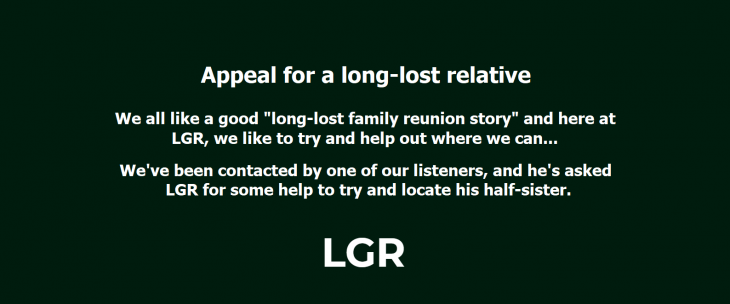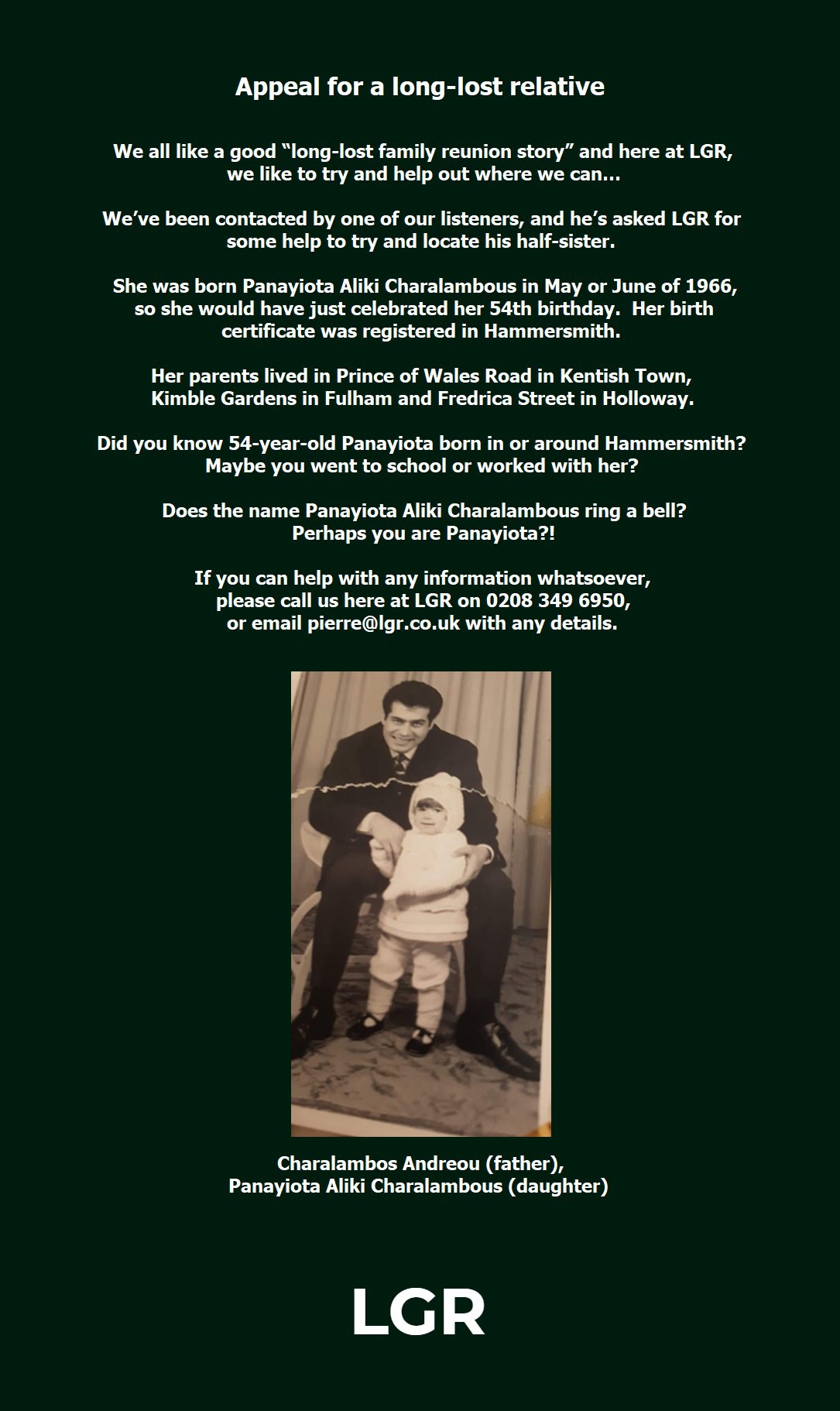NEWS

London Greek Radio Official UK Airplay Chart, with some of the biggest, most in demand hits in the chart.
Top 40 Official LGR Airplay Chart.
August 2nd to August 29th inclusive.
1 Konstantinos Argiros – Athina Mou
2 Natasa Theodoridou – Paradothika Se ‘sena
3 Nikos Vertis Feat. Amir – I Lexi S’ Agapo
4 Michalis Hatzigiannis – Horevo
5 Eleni Foureira – Temperatura
6 Giorgos Sampanis – Agria Thalassa
7 Helena Paparizou – Mila Mou
8 Josephine – Ego
9 Panos Kiamos – Dyo Metra Ouranos
10 Petros Iakovidis – S’ Agapao Sou Fonaxa
11 Paola – Flytzani
12 Kaiti Garbi Feat. Antonis Remos – Kivotos
13 Malou – Agyristo Kefali
14 Apostolia Zoi – M’ Agapas
15 Kaiti Garbi feat Alcatrash – Tha Melancholiso
16 Eirini Papadopoulou – Tis Kardias Mou O Erotas
17 Kostas Martakis – Allos Anthropos
18 Nikos Vertis – Poso Me Pligoses
19 Loukas Giorkas – Pame Ap’ Tim Archi
20 Kaiti Garbi – Ilios De Vgainei An Den Peis Kalimera
21 Petros Iakovidis – Fovamai
22 Josephine – Den Echo Sima
23 Nikos Kourkoulis – Elyne Kai Edene
24 Konstantinos Argiros – Ximeromata
25 Nikos Oikonomopoulos – Skase Ena Fili
26 Giorgos Mazonakis – Agapo Simainei
27 Melina Aslanidou – Den Vazeis Mialo
28 Christos Menidiatis – De Mporei
29 Giorgos Kakosaios – Erotas Moiazei
30 Giorgos Mazonakis – Dianykterevo
31 Onirama – Pou Isoun Chtes
32 Christos Mastoras – Den Echo Idea
33 Melisses – Misi Kardia
34 Giorgos Giannias – Kratise Me
35 Les Au Revoir – Oi Thalassies Oi Xantres
36 Stavento Feat. Themis Adamantidis – Na Diadothei
37 Nikos Oikonomopoulos – Valto Terma
38 Christos Menidiatis – Dyo Dromoi
39 Alcatrash – Xana
40 Giorgos Papadopoulos – Agapi Mou
Top 20 Greek Hits here: lgr.co.uk/chart/
Information and statistics credited to “Radio Monitor”.
Source: Official London Greek Radio Airplay Chart.
London Greek Radio, Since 1989.
The Original Station with the sounds of our culture.
Article written by London Greek Radio
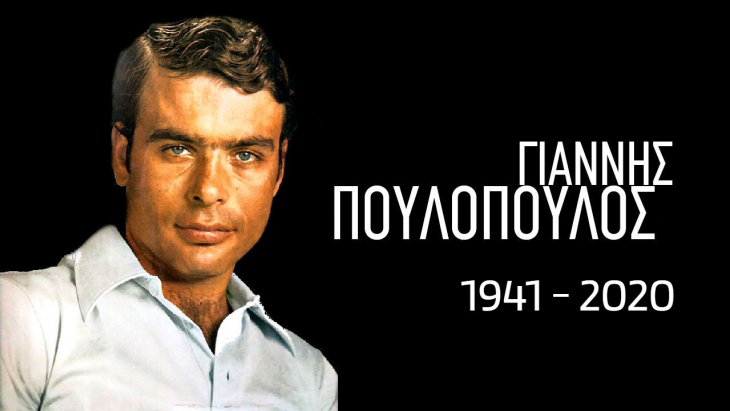
One of the greatest Greek singers in the history of popular Greek music, Giannis Poulopoulos died on Sunday night. He was 79.
It’s understood that the singer had been in intensive care at Attikon Hospital in Athens for serious health problems.
Poulopoulos was one of the biggest stars in Greek music, with a back-catalogue of hits spanning throughout the 1960s, 1970s and 1980s before noting a brief 1990s revival.
In terms of album sales, he is the fourth biggest-selling Greek artist of all time.
His popularity grew with a unique and distinctive melodic vocal tone and ‘elafrolaiko’ romantic style.
Giannis’ songs during the 1980s were to dominate LGR playlists, such as ‘Agape Me’ and ‘Mi Mou Thymonis Matia Mou’. Other hits included ‘Ola Dika Sou Matia Mou’, ‘Tha Pio Apopse To Feggari’, ‘Mia Fora Monaha Ftanei’, ‘Kamaroula Mia Stalia’ and ‘Pia Nyhta S’Eklepse’, amongst other songs.
Perhaps his most enduring hit was ‘To Agalma’, (The Statue), who remembers him first meeting his love and how the statue starts crying when it hears about his heartache and her wrong-doing.
He collaborated with some of Greece’s biggest composers such as Mikis Theodorakis, Giannis Spanos, Mimis Plessas, Manos Loizos amongst others.
His album ‘O Dromos’ by Mimis Plessas and Lefteris Papadopoulos in 1969 was to become the most successful selling album of all-time, selling in excess of three million copies, a feat that no other Greek album has approached to date.
Poulopoulos also appeared in several films, during the golden age of Greek cinema in the 1960s, such as ‘Oi Stigmatismenoi’, which also starred Giorgos Foundas and Maro Kodou; ‘O Tetraperatos’ with Kostas Hatzichristos; ‘Piraeus’ by Giorgos Katsaros, and in the romantic comedy ‘Tzeni-Tzeni’, where he performed with Tzeni Karezi.
Giannis Poulopoulos was born on 29th June 1941 in the village of Kardamili, in Messinia. His parents moved the family to the Saint Lerotheos neighbourhood in Peristeri, near Athens.
When he was just five years old, his mother died and he was raised, along with his younger brother Vasili, by his father Giorgios.
He started singing at a young age and worked as a builder, played soccer in Saint Lerotheos and Atromitos, and also painted.
At the age of 19, Giannis auditioned for Mikis Theodorakis, Apostolos Kaldaras, Vassilis Tsitsanis, and Giannis Papaioannou. Theodorakis was impressed and arranged for Poulopoulos to sing three songs in a theatrical production with Nikos Kourkoulos and Tzeni Karezi in Iakovos Kambanellis’s play, ‘The Neighborhood of Angels.’ He was signed to Columbia Records.
After leaving Columbia in 1964, he completed compulsory service in the army and was discharged two years later, where he started singing in small clubs in Plaka and recording songs again.
In 1966, he sang in a Mikis Theodorakis concert at the AEK stadium in Nea Philadelphia, together with Grigoris Bithikotsis, Maria Farantouri and Dimitris Mitropanos. In the same year he relaunched his recording career.
He retired from music in 1999, and was regularly approached with substantial proposals to sing in clubs and record again, however, the singer declined all offers.
Giannis Poulopoulos leaves behind a legacy of timeless classics and everyone at LGR is saddened to hear of his passing.
London Greek Radio will pay tribute to him from Monday 24th August to Sunday 30th August. May he rest in peace.
Giannis Poulopoulos 1941 – 2020.
Article written by London Greek Radio
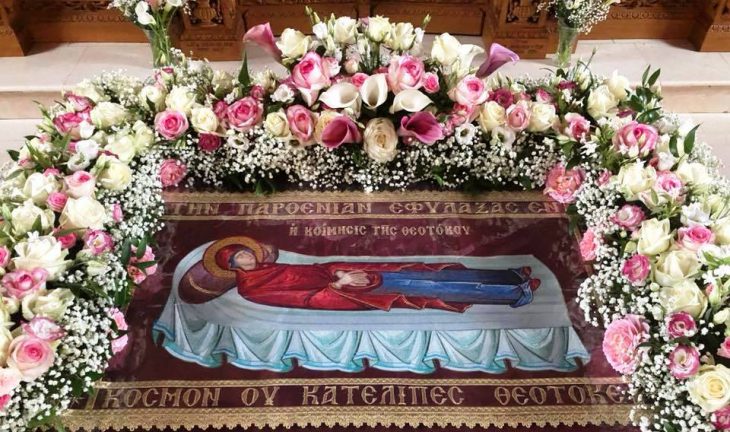
Cypriot and Greek Orthodox Christians celebrate the Feast of the Dormition of the Theotokos on August 15th or Dekapentavgoustos each year.
It is a national and religious holiday in Cyprus and Greece that marks the “falling asleep” repose or kimisis of the Virgin Mary, mother of the Lord Jesus Christ. The Feast also commemorates the Assumption of the body of the Theotokos into heaven.
Panagia was with the Holy Apostles on the day of Pentecost – a moveable feast that occurs 50 days after Pascha (Easter) and marks the descent of the Holy Spirit and the culmination of the Holy Trinity. All of the Apostles except Apostle Thomas were at Panagia’s bedside when she “fell asleep” and the Lord Jesus Christ came down and carried her soul to heaven.
The body of the Theotokos was laid in a tomb near the Garden of Gethsemane but the tomb was empty three days later when Apostle Thomas went to see her. The Assumption of the Theotokos (body) was later confirmed by an angel and an appearance she made in front of the Apostles.
The Orthodox Churches across the UK would have held a Great Vespers on the evening before the Feast, and on the day of the Feast, it is celebrated with the Divine Liturgy of Church Service in the morning.
31 years broadcasting the live Church Services on London Greek Radio.
One of the longest-running slots on LGR, every Sunday morning and at Easter.
There are three churches which are broadcast on a rotation, St. Andrew The Apostle, Kentish Town; St. John The Baptist, Wightman Road; and The Twelve Apostles, Hertfordshire, Brookmans Park.
Article written by London Greek Radio
Rebetiko musician Agathonas Iakovidis, best known for his collaboration with Koza Mostra in the Eurovision Song Contest 2013 has died suddenly.
Iakovidis died on Wednesday morning, 5th August, at his home in Thessaloniki at the age of 65, after an apparent heart attack, according to thestival.gr.
Agathonas whose signature Baglama wowed Eurovision fans with the song, “Alcohol is Free”, notching a Top 6th placing for Greece, which was their best result for that decade.
Many British fans rated the ethnic-ska-band’s song as one of the much-cherished entries from Greece. The song received the UK’s eight-points and a fantastic Twitter reaction from Eurovision fans.
As a friend of LGR, Agathonas performed a live acoustic performance with Koza Mostra, at our studios during a pre-contest tour and was one of the memorable Eurovision moments at London Greek Radio.
His parents hailed from Asia Minor, and he was born in Evangelisomos Langadas, Thessaloniki, in 1955.
He launched his musical career in 1973, with a fondness for Rebetiko and just four years later formed his own group, the “Rebetiko Band of Thessaloniki,” with a number of live concerts and two hit albums.
He was also known for his collaborations with musicians such as Costas Papadopoulos, George Koros, Vassilis Soukas, Lazaros Koutalidis, Nikos Filippidis and Nikos Hatzopoulos.
Earlier this year, the performer had paid tribute to hospital staff in Thessaloniki who were dealing with COVID-19 patients. He performed alongside fellow musicians at the entrance to hospital to express his thanks to the medical workers.
Everyone at LGR was saddened to hear of his passing and we express our condolences to his family and friends. May he rest in peace.
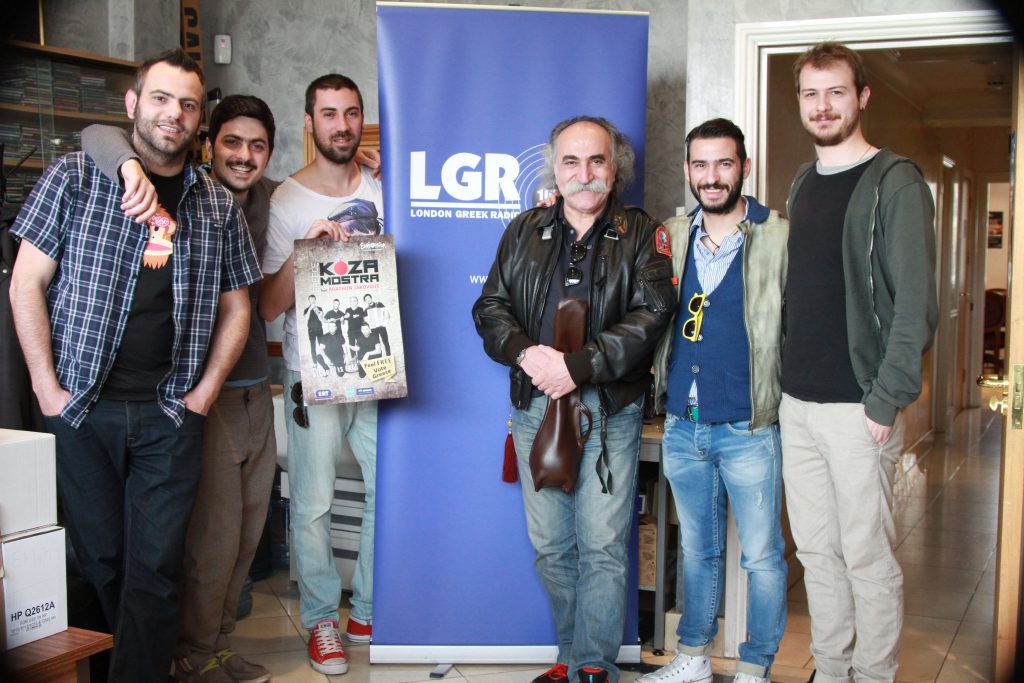
Article written by London Greek Radio

The “British-Cypriot” sitcom, ‘Stath Lets Flats’ was a double winner at the Bafta Awards on Friday night [July 31st], scooping Best Scripted Comedy and Best Male Performance for its star and creator Jamie Demetriou.
The programme has screened a second series last year and is a quirky, off-beat, eccentric comedy with a somewhat dry sense of humour.
The Channel 4 show, co-written by London-Cypriot Jamie Demetriou, with Tom Kingsley, Seb Barwell and Ash Atalla, beat out tough competition in the form of ‘Fleabag’ and ‘Derry Girls’ to take home the Scripted Comedy Award.
Mr Demetriou picked up a Bafta Craft Award for Comedy Writing for ‘Stath Lets Flats’, earlier this month.
Jamie thanked his fellow cast members in response to the Best Male Performance gong saying, “My character dosen’t work, my performance dosen’t work without the other cast so I want to thank my amazing sister Natasia [Demetriou] whose the heart of this show.
I want to thank the amazing Al Roberts who I have just worshipped, just everyone. Katy, Kiell, Christos, Ellie, Dustin, Nick and David. And finally I’d like to thank my dear friend Charlie Perkins for getting me to do comedy when I was trying to be the bad boy of musical theatre when I was 21, thank you for saving me some embarrassment. And I want to thank my parents for their amazing love and specificity.”
The lead character, “Stath”, (Jamie Demetriou) plays an imbecilic lettings agent working at ‘Michael & Eagle Lets’, an apparently chaotic London lettings agency run by his father, “Vasos”, (Christos Stergioglou).
The set-up is that Stath comes across as incompetent, impulsive and ambitious – in equal measure, and is desperate to prove himself to his Greek-Cypriot father who is retired and at home in series two but still as ever-observant and watchful over his son’s antics.
Demetriou is awaiting a possible confirmation to a third series from TV chiefs at Channel Four.
The annual ceremony was broadcast on BBC One and was the first in its history to be held virtually.
Richard Ayoade hosted the event in a closed and socially distanced studio, with winners accepting their awards via video link.
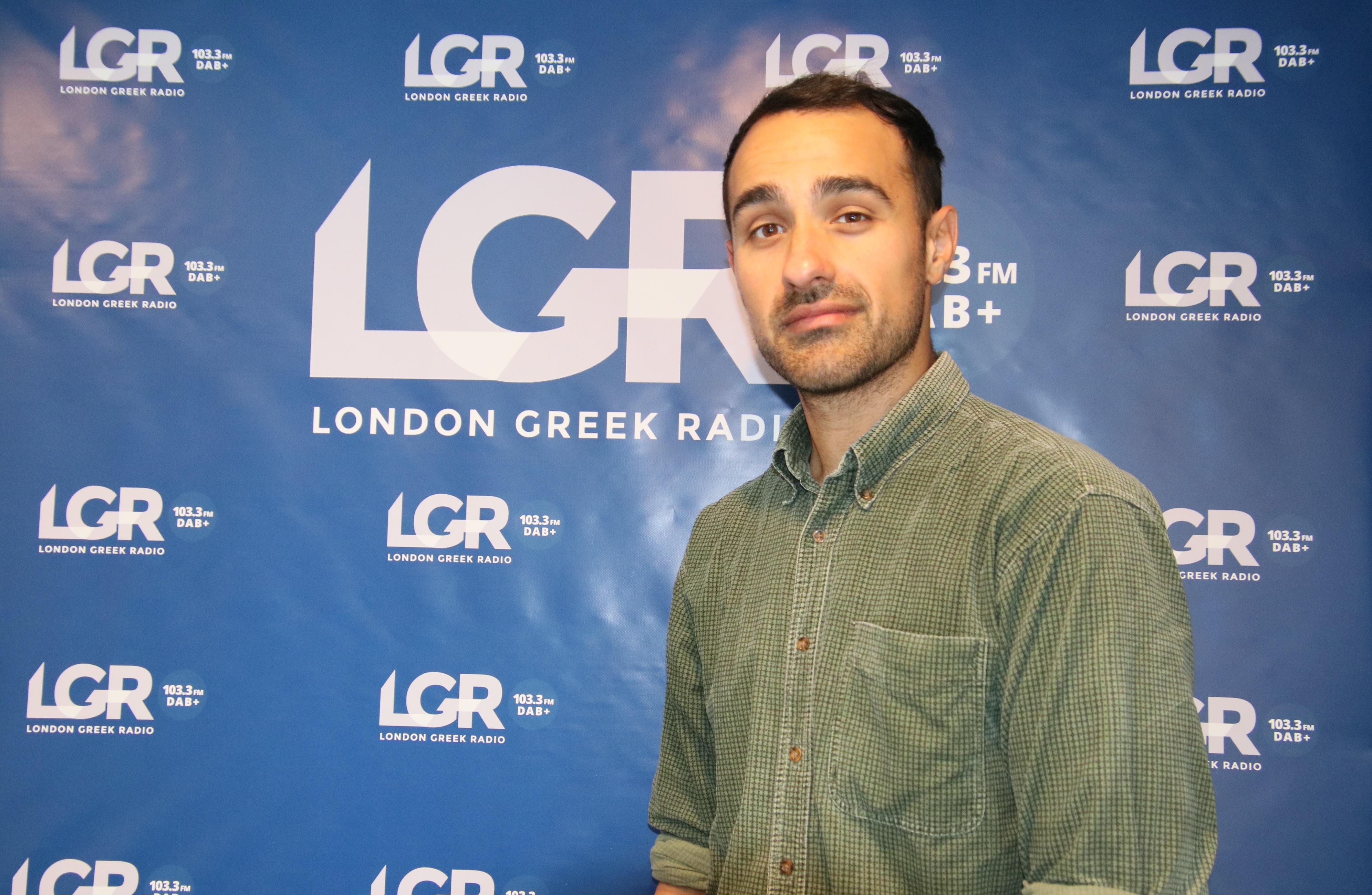
Jamie Demetriou: “London Greek Radio has been playing in my house since I was a foetus.”
We all grew up to it…
Article written by London Greek Radio
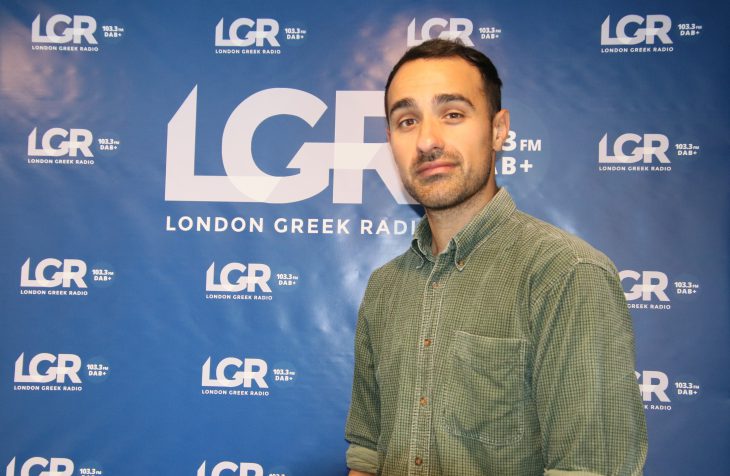
The “British-Cypriot” sitcom, ‘Stath Lets Flats’ is in the running to win a Bafta for Best Scripted Comedy.
The programme has screened a second series last year and is a quirky, off-beat, eccentric comedy with a somewhat dry sense of humour.
The Channel 4 show, co-written by London-Cypriot Jamie Demetriou, with Tom Kingsley, Seb Barwell And Ash Atalla, is shortlisted alongside ‘Derry Girls’, ‘Fleabag’ and ‘Catastrophe’.
Jamie Demetriou is also nominated for the ‘Writer (Comedy)’ category as well as for ‘Male Performance in a Comedy’.
Mr Demetriou picked up a Bafta Craft Award for Comedy Writing for ‘Stath Lets Flats’, earlier this month.
Jamie thanked his fellow cast members and production team in response to the award saying, “Thank you, Bafta Craft, for this award it’s made me feel very grown up and scared.
“Congrats to my fellow nominees, thank you so much to everyone at Channel 4. Thank you to the ‘Stath Lets Flats’ team – Sed Barwell, Tom Kingsley, Ash Atalla, Jon Petrie, thank you for your support and guidance and to my reps… and thank you so much to the exquisite cast of ‘Stath Lets Flats’, without whom the brilliant scripts would make no sense, to my brilliant sister Natasia [Demetriou], Alastair, Kiell, Katy, Christos, Dustin, Ellie, Nick, David [and love] to my parents…”
The lead character, “Stath”, (Jamie Demetriou) plays an imbecilic lettings agent working at ‘Michael & Eagle Lets’, an apparently chaotic London lettings agency run by his father, Vasos, [Christos Stergioglou).
The set-up is that Stath comes across as incompetent, impulsive and ambitious – in equal measure, and is desperate to prove himself to his Greek-Cypriot father who is retired and at home in series two but still as ever-observant and watchful over his son’s antics.
Demetriou is awaiting a possible confirmation to a third series from TV chiefs at Channel Four.
The British Academy Film & Television Awards ceremony will air on Friday 31st July on BBC One.
In accordance with current restrictions, the awards will take place in a closed studio, with winners invited to accept their awards ‘virtually’.
Article written by London Greek Radio
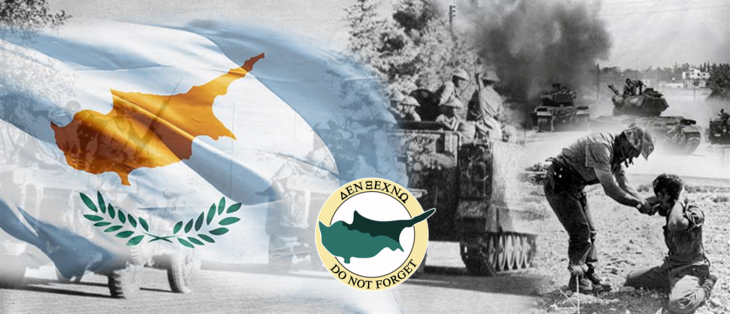
On July 20, 1974 at 5:30am, Turkish troops landed on the Republic of Cyprus’ coast five miles off Kyrenia. Since that day, nothing on the island has ever been the same.
Every year since, on the anniversary of the invasion, sirens have blared out over the Republic, recalling the moment Turkish troops invaded.
In 1974, approximately 40,000 Turkish troops under the command of Lieutenant Nurettin Ersin implemented their invasion plan, code-named ‘Attila’, illegally invading the island in violation of the UN Security Council Charter.
Turkey still illegally occupies 37 per cent of Cyprus’ territory.
Turkish troops invaded Cyprus on July 20, 1974, five days after the legal government of the late Archbishop Makarios III was toppled by a military coup, engineered by the military junta then ruling Greece. Two unproductive conferences in Geneva followed; the first between Britain, Greece and Turkey and the second with the additional attendance of Greek Cypriot and Turkish Cypriot representatives. Three weeks after the ceasefire of July 22, and despite the fact that talks were still being held and just as an agreement seemed about to be reached, the Turkish army mounted a second full-scale offensive. As a result, Turkey increased its hold to include the booming tourist resort of Famagusta in the east and the rich citrus-growing area of Morphou in the west.
All in all, almost 37% of the territory of the Republic of Cyprus came under Turkish military occupation. Nearly one-third of the population, some 200,000 Greek Cypriots, were forcibly uprooted from their homes and properties, thousands were killed during the hostilities, over 1,000 persons were listed as missing while thousands of Greek Cypriots and Maronites remained enclaved.
Numerous UN resolutions have demanded respect to the independence, unity and territorial integrity of Cyprus, the return of the displaced to their homes, and the withdrawal of foreign troops from the island, but all resolutions have been ignored by Turkey.
The National Federation of Cypriots in the UK last week, July 14th rallied a virtual All-Party Parliamentary Group ‘Cyprus@60: Opportunities, Challenges, Prospects for Reunification’. The Cypriot Foreign Minister Nikos Christodoulides briefed the APPG and members of the UK Cypriot community with the latest developments on the Cyprus issue, as well as other developments in the Eastern Mediterranean region.
He explained that Cyprus has always had a positive agenda and has never sought a “negative” foreign policy. He also noted that Cyprus strives to cooperate with its neighbouring countries on common principles and forge close partnerships across a wide range of fields.
He assured the Parliamentarians that Cyprus remains “strongly committed” to efforts to reunify the island and its people and that it remains ready to resume negotiations from where they have stopped.
The Federation President, Christos Karaolis, emphasised the tragedy of the fact that the Republic of Cyprus has “only been free and united for less than a quarter of its entire existence”. Mr Karaolis said, “what we want is simple, fair and rooted in international law – a free, re-united Cyprus that is based on the relevant United Nations Security Council Resolutions and High-Level Agreements.”
Karaolis also spoke of the close relationship that Britain and Cyprus share and said that “in a world where it [the UK] is not a member of the European Union, it can safely look towards the Republic of Cyprus as a reliable and predictable partner.” He concluded by paying tribute to all Presidents of the Republic of Cyprus since 1960 for “their immense contribution to Cyprus’ growing national story.” He also expressed gratitude towards all the British parliamentarians who have opposed the occupation of Cyprus and stood beside Cyprus during its first 60 years of independence.
Listen to the full broadcast on LGR this Monday evening from 7pm.
46 years on from the most tragic page in the Republic of Cyprus’ history, at 5:30am the war sirens rang around the island once more.
Article written by London Greek Radio

London-Cypriot actor and writer Jamie Demetriou won Writer: Comedy for ‘Stath Lets Flats’ at the 2020 Television Craft Awards online ceremony, last night (July 17th).
Recognising the wide variety of behind-the-screens talent that goes into making television programming, this year’s ceremony was held via an online stream amidst the coronavirus outbreak, and hosted by Stephen Mangan.
Demetriou beat off fellow nominees Sam Leifer (Plebs), Phoebe Waller-Bridfe (Fleabag), Danny Brocklehurst (Brassic), Tom Basden (Plebs).
Jamie thanked his fellow Stath cast members and production team in response to his win. Jamie responded in a video: “Thank you Bafta Craft for this award it’s made me feel very grown up and scared. Congrats to my fellow nominees, thank you so much to everyone at Channel 4. Thank you to the ‘Stath Lets Flats’ team Sed Barwell, Tom Kingsley, Ash Atalla, Jon Petrie, thank you for your support and guidance and to my reps… and thank you so much to the exquisite cast of ‘Stath Lets Flats’ without whom the brilliant scripts would make no sense, to my brilliant sister Natasia [Demetriou], Alastair, Kiell, Katy, Christos, Dustin, Ellie, Nick, David…”
Star-of-the-show, “Stath” Mr Demetriou is playing an incompetent, impulsive and ambitious letting agent, at ‘Michael & Eagle Lets’, a dodgy London lettings agency [owned] by his father, Vasos, (Christos Stergioglou). The father who in series 2, is at home and retired is as still ever-watchful over his son’s antics.
The “British-Cypriot sitcom” with its lead characters siblings Jamie and Natasia Demetriou, is a quirky and off-beat comedy. The cast seem to compliment the subtle jokes and kind of British eccentricity, really well.
Jamie is in the running to take home a BAFTA Television Award for Best Scripted Comedy, Writer: Comedy category and Male Performance in a Comedy.
The British Academy Television Awards ceremony will air on Friday July 31st on BBC One.
Article written by London Greek Radio
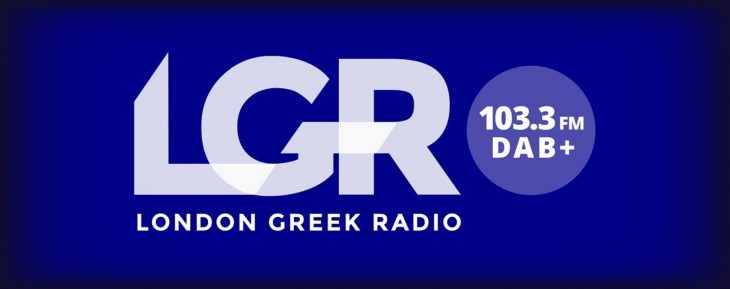
London Greek Radio (LGR) is further refreshing its schedule with two new presenters who join the radio station this week.
After a protracted period of training due to the Coronavirus pandemic, both presenters have patiently been waiting to hit the LGR airwaves.
Kostas Voudouris and Stelyo Siderides both have a diverse background and are looking forward to entertaining LGR’s listeners.
Stelyo has been involved in the music scene for 30 years, hosting many events within the community, focusing on Greek and English parties.
He was born in north London and his father, a Greek, originally came from Constantinople. His mother is from Lympia in Cyprus.
Kostas Voudouris is London-based and raised in Thessaloniki, Greece where he was a frequent DJ in several nightclubs.
Kostas joins LGR with a view to bring listeners the latest hits and exclusives, as well as uncovering the hits of the future.
LGR’s Head of Programming, Pierre Petrou said: “Since expanding our coverage across the DAB+ Digital Radio network, it’s great to add to our already experienced team. Our existing presenters have already taken our online listening to an all-time high so the lads have got a lot to live up to! We are really excited to have them join us at such a pivotal time.”
London Greek Radio will shortly be launching their second round of presenter recruitment and listeners are urged to stay tuned to hear what they need to do if they wish to be considered to join LGR!
The new presenters join LGR as the station continues to operate temporary scheduling and for this week, you can hear Stelyo and Kostas for the first time as follows:
Kostas Voudouris: Monday 1-4pm; Wednesday 10pm-12am; Friday 9pm-12am.
Stelyo Siderides: Thursday 7-9pm.
Stelyo and Kostas join LGR during the global Coronavirus pandemic which has seen some temporary changes to LGR’s schedule. As with other radio stations, some programmes on LGR were extended to three-hours and there has been a limited number of presenters available due to the ‘lockdown’.
LGR’s Programming Department has also introduced weekly Covid19 updates direct from Cyprus and Greece, along with features such as the “Recipe of the Week” with George Psarias and “Psychological Support” with ‘Dr Vass’. (Vasos Vasilios Silivistris).
In addition, Anta Murati provides “Entertainment News” each Friday evening, keeping listeners up to date with celebrity news from Greece, Cyprus and the UK.
London Greek Radio is on 103.3FM in London, DAB+ in Birmingham, London, Manchester & Glasgow and online at lgr.co.uk
Article written by London Greek Radio
